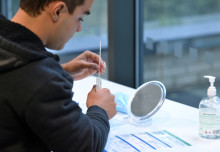

European honour for Imperial Professor<em> - News</em>
See also...
By Danielle Reeves
Monday 27 October 2008
A leading researcher on the malaria parasite and transmission of the disease has been awarded a special lifetime achievement prize by the Louis-Jeantet Foundation, a Swiss-based organisation that provides funding and major prizes for biomedical research.
The award was given to Professor Fotis Kafatos, Chair of Immunogenomics in Imperial's Department of Life Sciences. It recognises his major contributions to the development of European biomedical research on the world stage, as well as his exceptional research into the biology of the Anopheles mosquito – the carrier of the malaria parasite Plasmodium.
Professor Kafatos received the lifetime achievement award on 9 October 2008
The prize was announced on the 25th anniversary of the Foundation, and was awarded to Professor Kafatos at a ceremony in Geneva on 9 October 2008. Introducing Professor Kafatos at the ceremony, Professor Bernard Rossier, the Secretary of the Scientific Committee of the Foundation, said:
"Our Foundation has recognized in Fotis Kafatos a tireless developer of science in Europe. For a number of years he has directed with skilled hands the famous European Molecular Biology Laboratory (EMBL) at Heidelberg. More recently he has been a key figure for the creation of the European Research Council which he heads and which for the first time gives to Europe a supranational institution to finance fundamental 'bottom up' research rather than 'top down' applied science."
Professor Kafatos' research focuses on unraveling the immune system of Anopheles mosquitoes and understanding the complex process by which they transmit malaria parasites into humans. Malaria parasites from the blood of infected humans or other mammals complete their development cycle inside the mosquito, maturing and travelling from the gut to the salivary glands, from where they infect other individuals when the mosquito takes a blood meal.
Professor Kafatos hopes his team's fundamental research will lead to new chemical and transgenic methods to block the progression of the parasite's development inside the mosquito, halting the transmission of this deadly disease which kills nearly one million people every year.
Commenting on receiving the prize from the Louis-Jeantet Foundation, Professor Kafatos said: "I am delighted by this special award from a leading European foundation, honouring the research discoveries that my colleagues and I have made at Imperial and EMBL. I am also extremely pleased that the Foundation has recognised the ongoing construction of the ERC, which is being pursued collaboratively by the autonomous ERC Scientific Council and the European Commission.
"We are all delighted that the ERC has been embraced so warmly by both the scientific and the political communities, and that it has already received worldwide recognition as an innovative agency, supporting research at the frontiers of science and scholarship in all fields."
Over the last decade Professor Kafatos has helped change the field of malaria research beyond recognition, by leading the development of molecular approaches to understanding the interactions between the Anopheles mosquito and the Plasmodium parasite. He helped coordinate the Anopheles genome sequencing project and led its subsequent utilisation in functional genomic analyses, focusing on the molecular physiology of infection and mosquito innate immune responses to the parasite.
In 2007 Professor Kafatos became the first President of the £5 billion European Research Council - the first pan -European funding agency for frontier research in all fields of knowledge, from the Humanities and Social Sciences, to the Life Sciences and to the Physical and Engineering Sciences.
-Ends-
Article text (excluding photos or graphics) available under an Attribution-NonCommercial-ShareAlike Creative Commons license.
Photos and graphics subject to third party copyright used with permission or © Imperial College London.





